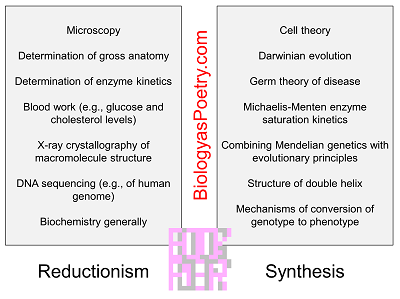∞ generated and posted on 2016.08.21 ∞
The building up of understanding of systems by combining knowledge of component parts.
While reductionism can be experimental or involve mathematical modeling, synthesis tends to involve logical arguments. A good synthesis, however, will suggest further experimentation and modeling.
A good syntheses will provide the framework within which one can understand otherwise disparate, individual aspects of biology. They provide the connections between ideas where connections otherwise can be lacking, allowing an appreciation of biology as a much more coherent whole rather than discordant sets of facts.
This is not to say that synthetic thinking need be hugely expansive. Instead, every time you come to understand one aspect of biology based on your understanding of another aspect, or even understanding biology as a science from other aspects of your life (or vice versa, etc.), you are synthesizing ideas. That is, coming to appreciate connections which previously had not been apparent to you.

Figure legend: Comparison between reductionist approaches to biology versus syntheses. Note that reductionism tends to be associated with specific techniques whereas syntheses are combinations of ideas. Note also that reductionism doesn't specifically mean that very small things are what is being studied, though the taking of systems apart to their components does tend to reduce things in size, whether they be cells to their molecular components or ecosystems to model microcosms.
The greatest work of synthesis in all of biology can be found here.
See by contrast chemical synthesis as well as biosynthesis and anabolism: These concepts represent, analogously, the building up of chemical components into larger, more complicated, or more all-encompassing compounds.